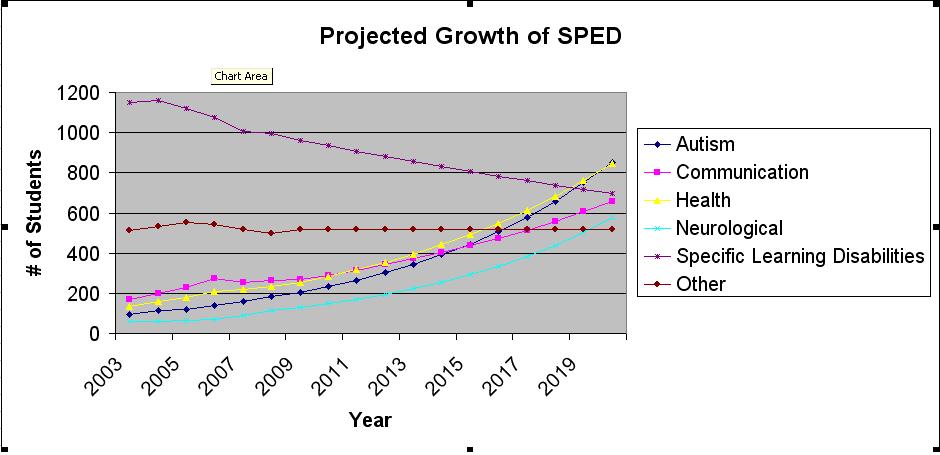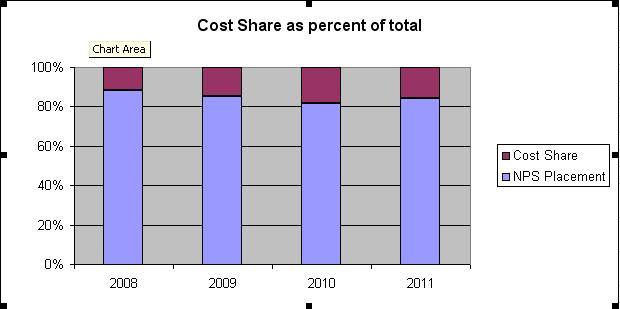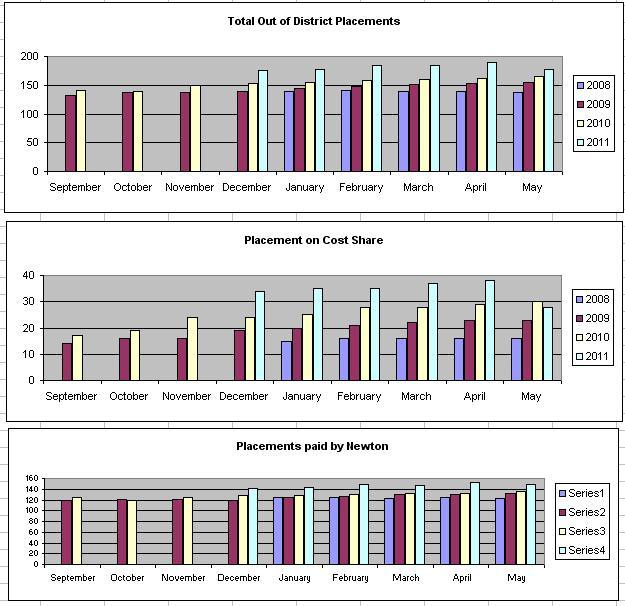NPS:Special Education: Difference between revisions
| Line 202: | Line 202: | ||
month. Each Special Education expense is being carefully monitored in terms of staffing, contract |
month. Each Special Education expense is being carefully monitored in terms of staffing, contract |
||
costs, tuition and transportation for the end of FY11 as well as into next year. |
costs, tuition and transportation for the end of FY11 as well as into next year. |
||
<gallery> |
|||
Image:NPS-SPED-Costs-June-2011.PNG|End of year SPED Costs June 2011 |
|||
</gallery> |
|||
<br> |
<br> |
||
Revision as of 13:27, 22 June 2011
Info on Response to Intervention
Report delivered to the school committee on June 13
PPT delivered at the same meeting
Paper quoted at the top of the report
DESE Paper cited in the report
Forthcoming paper by people cited in report above
Links to more web sites with information on RtI and Tiered Instruction
International Reading Association
National Center on Response to Intervention
RtI Action Network
Pyramid Response to Intervention (combines PLCs and RtI)
Association for Supervision and Curriculum Development
Considerations for Aides and Co-Taught Classrooms
An e-mail exchange with the authors of a study on paraprofessionals is here:
How to decide when to use aides
This exchange includes lots of good info and advice on how to decide between co-taught classes and aides. It also includes links to additional research:
Constructively responding to Requests for Paraprofessionals
Guidelines for selecting alternatives to paraprofessionals
One-to-One Paraprofessionals for Students With Disabilities in Inclusive Classrooms: Is Conventional Wisdom Wrong?
See page 9 of this last article for an important reference on how to use this research
Some comments on how to use aides from a professor of SPED at UVM: From my personal experience I consider some of the ways in which a paraeducator was most useful to be:
- to model effective interactions for the other students--for example, since Andreas had little respect for personal space of others, and would try to hug, the students were taught to counter his enthusiastic approach by offering a high-five;
- to assist with personal care;
- to assist with desensitization--for example, helping him accept toothbrushing, overcoming his tactile defensiveness;
- to transport him for jobs in the community and serve as job coach;
- to assist the school nurse in the case of seizures;
- to assure safety in situations where his impulsiveness could create danger (like bolting into the street);
- to carry out sensory integration procedures (like brushing);
- to assist the teachers in creating accommodations (like finding and bringing in a full-size skeleton poster for identifying bones, or enlarging graph paper so that he could be accurate in placing data points);
- to support his use of communication devices (programming, trouble-shooting);
- to serve as facilitator in facilitated communication (but should NOT be the sole facilitator, as communication can fall apart if that person leaves the job);
- to assist with transitions;
- to cue him on appropriate responses.
A recent BSEA case says that moving a child to a co-taught classroom is not a new "placement".
See: http://www.doe.mass.edu/bsea/rulings/11-0594.doc
See a description of Newton's co-taught classes here: http://www3.newton.k12.ma.us/sites/default/files/cotaughtstudentservices.pdf
Parents who have a concern with Newton's co-taught classroom and do not want to send their child to a co-taught class can still reject an IEP. You need to do it based on something more than just the fact that its a co-taught class. Think carefully about what your concerns are and if NPS can address those concerns within the co-taught class.
These look like great programs and I hope they succeed. However, they wont be right for every child so the following is meant to help parents understand how best to preserve your options.
For example, if you have a 1:1 aide and you want to keep that level of attention for your child you can ask that they keep the 1:1 aide in the co-taught class. If you have concerns about your child being in a largely special education class you can make that case. Regardless, make sure to send a letter to the Team. Get an attorney or advocate if you can.
You should decide as early as possible if you will send your child to a co-taught class if it's adapted or you absolutely will not, regardless of changes.
Here are some suggestions for ways to follow up on co-taught classes and make the case that they should be adapted or are not right for your child:
- Get an independent evaluation (often paid for by insurance). Have that person meet with your child then visit the co-taught class. Ask them to document the needs of your child and what is not available in the co-taught class. They need to make specific recomendations for services.
- e.g needs a quiet space to learn to read like a Learning Center or needs more constant supervision (aka aide).
- Ask for the resumes and credentials of the teachers in the co-taught class. Get your own expert to state whether they have the skills or training to provide the services your child needs. In co-taught classes some services are provided by regular education (non-SPED) teachers. You can make the case that all services must be provided by trained and qualified special educators.
- Ask for the a list of the diagnoses of the other children in the class and ask for their IEPs. Get an expert to state whether or not it's a valid cohort (aka are the other children appropriate peers). You can make the case that your child needs a specialized and focused class (e.g. focused on social skills) while co-taught classes cover a range of diagnoses but do not address any specific one well.
Summer Camp Info
Links and Comments on Summer Camps
SPED Study Links and Documents
NPS contracted with a group to do a study of special education. Their final report is due in January.
Web site of group doing the a study of special education: http://districtandcommunitypartners.org/
RFP issued for the study:
http://www.ci.newton.ma.us/purchasing/bids/fy10/10-30-RFP-SPED-Conslt(2).pdf
Sample Home School Logs
These are examples of logs parents and teachers/aides can use to share info between home and school. Typically an aide or other school person send the log home every afternoon and the parents send it back. It's a good way to share info and stay in touch, but sometimes the child will read the log too so e-mail may work better for more delicate discussions.
Glossary of Special Education Terms Used in Newton
Please add to this section and write definitions.
- Inclusion
- Integrated classes
- Inclusion Facilitator
- Team
- Aide
- Behavior Therapist
- BCBA
- Out of district placement
- Cost share
- Co-taught classrooms
- Stabilization program
- Neighborhood Inclusion
- Learning Center
- IEP
- 504 plan
- Applied Behavioral Analysis (ABA)
- Integrated program
- Language development classes (REACH)
- Office of student services
- Early Childhood Program
- Ed Center
Report on trends in Special Education
Report on trends in Special Education by Judy Levin-Charns from 6/2010
The following graph projects the data from the trends report in to the future. Based on the data from 2003 - 2009, the average rate of growth in each category is used to predict the numbers up to 2019.
See also comments on the 6/28/2010 meeting
Community Advisory Group Report on School Costs
This detailed report includes a long section on Special Education.
They looked at:
- The efficacy and fiscal sustainability of the Neighborhood Inclusion model;
- The lack of agreed-upon metrics to measure outcomes of programs and services;
- The absence of a consistent and easily understandable summary of special education costs and revenues (presented in a way that allows easy analysis of growth trends, etc.);
- A lack of transparency about the special education programs and services provided within Newton Public Schools;
- A lack of public understanding about special education generally – what it is, the diversity of the special needs population and profiles, the legal mandates under which services are provided, and the individualized nature of each student’s educational plan.
And they identified three areas of cost growth:
- Aides
- Transportation costs
- Out of district tuitions
- Contracted services
This section (bold emphasis added) discusses the idea of city wide classes. Despite the concerns raised in this report, this approach was adopted in the FY 11 budget and will be implemented this year (2010 - 2011). AFAIK, any analysis of integrated classrooms was not made public.
"In January 2008, the Newton Public Schools modeled the cost of creating substantially separate classrooms in each elementary school to determine if clustering children within their schools would reduce costs (by reducing the number of aides). The modeling showed that in 13 of the 14 elementary schools, clustering students into a substantially separate classroom would have been approximately $582,000 more expensive. The analysis did not model the costs of clustering the students across the City or by villages as this “would not only pose a further regression for any inclusive practice, but would add transportation costs.” (As noted above, special education transportation costs grew at a CAGR of 10% from 2004-2008.) Note, too, that space constraints may make the creation of substantially separate classrooms infeasible.
Substantially separate classrooms may also not be desirable or appropriate from an academic standpoint. Because each child’s needs are unique and can vary widely (even within a “common” or “like” disability), there may not be an appropriate grouping at a certain grade level to support substantially separate classrooms that would meet the students’ academic needs. The Newton Public Schools are working on modeling and documenting the viability of more integrated classrooms. The Citizen Advisory Group applauds this effort and encourages the Newton Public Schools to make its analysis available to the public."
State Reports on SPED in Newton
- State 6 year review of Newton's special education programs:
This is an excellent guide to what the school system is supposed to do. It also lists where they are close but deficient.
http://www.doe.mass.edu/pqa/review/cpr/reports/2007/0207.doc
Here is the response to the items cited as partially implemented:
http://www.newton.k12.ma.us/central_admin/documents/NEWTONCAPReviewCoverLetterandApprovalFormFINAL_001.pdf
- State's Three year mid-cycle review
DESE Review of Submitted Reports and Status Sheet
Follow up on three year review
2010 Department of Elementary and Secondary Education (DESE) Mid-cycle Report
Student Services Reports
Out of District Placements Graphs
NPS stopped reporting how many out of district placements are due to cost shares in the school year starting September 2010. As of November, 2010 the total number of out of district placements is 171. An increase of 21 (14%) over Novemember 2010.
The charts below show the growth of out of district placements through May 2010.
In particular, the fraction of "cost share" placements is growing faster than out of district as a whole and faster than Newton placements.
Link to School Committee meeting info: http://www3.newton.k12.ma.us/schoolcommittee/meetinginformation
There has been very little on Special Education in 2011. The reports are now one paragraph.
Last Fiscal and Operations report of 2010 - 2011
Extract of Student services sectin:
Student Services/Special Education
The current status of key areas of the Student Services budget is summarized in Appendix A. The
deficit for all Student Services accounts increased by a net of $19,000 since last month, and is currently
-$1,129,000. Savings since last month of $125,000 reflect a detailed analysis of all year end placements
and include transportation ($78,000) and out-of-district tuition ($47,000). Total savings are offset by
increases in Special Education salary accounts ($52,000) and contracted services ($92,000). Aide
accounts are projected to be over budget by $268,000 by the end of the fiscal year, or $12,000 more than
last month. Within Special Education transportation, 490 students were transported this month versus
478 students last month, an increase of 12 students. Of the 490 students, 137 students are transported to
private placements and 353 students are transported within the Newton Public Schools. There are
currently 151 students placed out-of-district, or 5 more than one month ago. Contracted services
provide needed assistance to students across all grade levels; this account is adjusted monthly to reflect
an assessment of all spending through the end of the fiscal year and has increased by $92,000 since last
month. Each Special Education expense is being carefully monitored in terms of staffing, contract
costs, tuition and transportation for the end of FY11 as well as into next year.
End of year superintendent report
Links to NPS and PAC Web Sites
Newton Parent Advisory Committee Web Site: http://www.newtonpac.org
PAC Yahoo Group: http://groups.yahoo.com/group/newtonpac/
Main Newton Special Education Page: http://www3.newton.k12.ma.us/studentservices
The Newton Partnership: http://www.newton.k12.ma.us/newtonpartnership
Special Education Programs and Services
Links from NPS Web site:
Main Special Education Page
Stabilization Programs
Guide to All Programs
Co-Taught Neighborhood Classroms
We could add a page here for each school. It can include comments by parents on special education, lists of programs and services etc.
History of special education in Newton
The following was heard second or third hand. Not sure if it's true but it sounds plausible.
In the 1990s parents were concerned that their children were being isolated in programs within Newton and out of district. A SPED director was hired from Brookline who was committed to inclusion. Newton became really good at inclusion. A new SPED director (Mozelle Berkowitz) was hired possibly in early 2000s who continued that trend but the pendulum started to swing the other way. Parents who had problems with the district couldn't get their children out. A new SPED director (Judy Levin-Charnes, current director as of this writing) was hired in 2007-2008 from Sharon. The challenge of parents not being able to get their children out of district placements grew.
Anyone with more history, please add it here...
More? add your own and comment
The main Newton Public Schools Documentation Project page is here: Home Page
This project and information is not affiliated with the Newton Public Schools or the Newton School Committee. It is an independent effort by private citizens intended to help the people of Newton learn more about the Newton Public Schools
Much of this information is extracted from the document archive linked from All School Committe Docs
Additional comments and information from public sources have also been included. The contents and links may have been edited as well. No representation is made as to the accuracy or validity of this information. This page is only intended to help people more easily keep in touch with the work of the Newton School Committee
Please add your comments on the discussion page and add to or update any other pages
Newton Public Schools Web site
Newton School Committee Web Site
Pages collected under SPED namespace
BSEA:Decisions
Newton Public Schools
Barnstable Public Schools
Boston Public Schools
Northampton Public Schools
Main page



